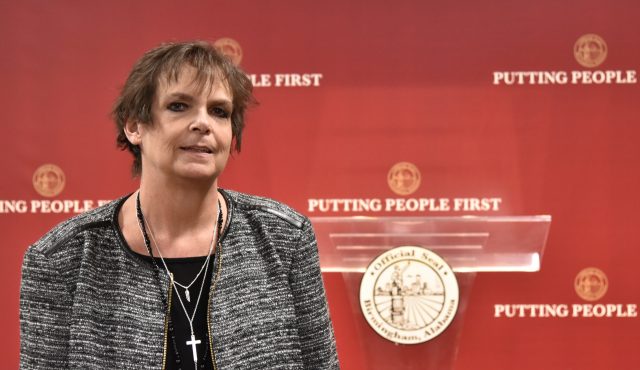
Solomon Crenshaw Jr.
For The Birmingham Times
One thing for sure about promotions in the Birmingham Police Department is that officers are not promoted because of who they know, said the city’s human resource director.
Procedures are in place for promotions within the police department that have yielded more diversity in leadership, said Jill Madajczyk, the HR director. “We have seen that the number of promotions in both police and fire for women into leadership positions has increased,” she said. “It has also resulted in us finding the most qualified candidates out of the group of individuals that are eligible for the promotion.”
“What we’ve done since Mayor (Randall) Woodfin has been in office is HR has taken over more control of our secondary process,” Madajczyk said. “We actually use a three-phase process to narrow down and to identify who are the top qualified candidates based on the criteria that we work on with the leadership of the police department.”
The process has created a much more objective standard, Madajczyk said. “We’ve heard very complimentary things from individuals in the department who feel that this does accurately represent the knowledge, skills, and abilities that are needed to promote through the ranks of the Birmingham Police Department.”
The Dec. 18, 2020, promotion of Anja Doyle brought to five the number of female captains in the Birmingham Police Department. Doyle, Shelia Finney, Janice Blackwell, Michelle Pruitt and Julie Quigley-Vining are the first five female captains to serve at the same time in the Birmingham Police Department.
The HR director said the first phase of the promotion process is a written assessment in which individuals are given a fact scenario. In a controlled setting, they have to respond in writing to the fact pattern that’s given, identifying the proper procedures to use under the Birmingham Police Department rules and regulations.
The written assessments are scored by other individuals in the police department, Madajczyk said. For instance, if a captain position is being filled, the assessment will be scored by current captains and any of the deputy chiefs, assistant chief or the chief.
“What we’ve done is we have ensured that those questions are in a very controlled setting,” she said. “Those questions are developed by either the chief or the assistant chief at the police department … with human resources.
“And those are only shared between HR, and that particular individual that was designated by the police department,” the HR director said. “In the past, there were some allegations that people may have been sharing what the questions were going to be before the testing process.”
The second phase of the process is what’s called a personal accomplishment workbook.
“That’s based on the education, experience and training that an individual has received,” Madajczyk said, adding that commendations and community service awards are considered to get a score. “When the scores from Phase One and Phase Two are completed, depending upon the number of actual vacancies and the number of candidates that were sent over, there is a third phase which is an interview that is conducted by a three-member panel. Again, HR works with only BPD leadership, which is the chief and the assistant chief in drafting the questions.”
Expected responses are drafted to the questions asked. A candidate’s answers can be graded from one, which is “unacceptable,” to seven, which is “exceptional,” she said.
“We identify what are the responses that a candidate should be either giving during the oral interview or in writing during the writing sample,” Madajczyk said. “The whole point of the questions is to ensure that the candidates understand and have knowledge as to what the Police Department expects to be done. And because we control the questions and because we provide the expected responses, we have found that it has taken the subjectivity out of the process because each of the scoring methods is monitored by HR.
“We are not police experts,” she said, “but we participate to ensure that each candidate is being evaluated upon either their written response or upon what they actually say during the interview. By HR participating and monitoring, it allows us to make sure that all candidates are being scored based on the same criteria.”




